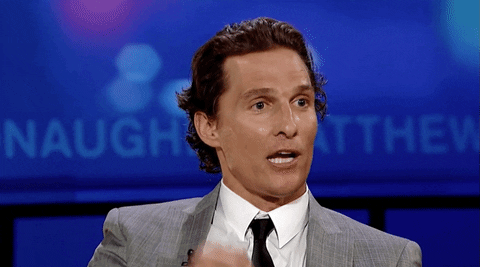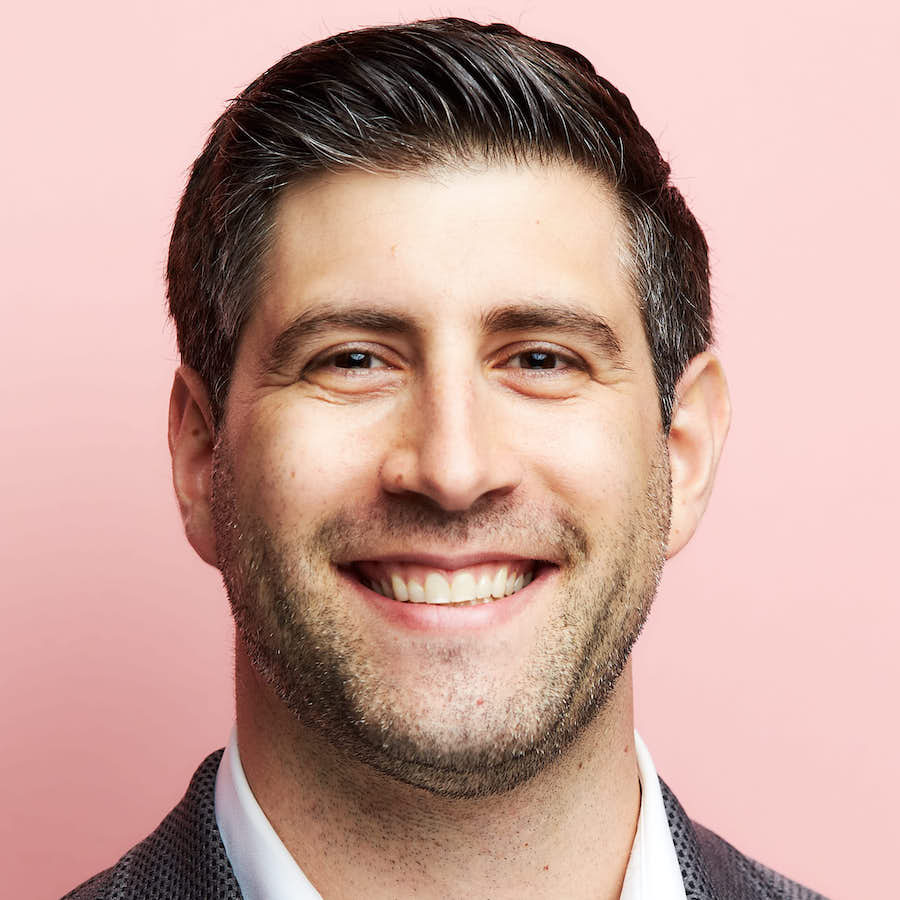One Tiny Trick for Great Podcast Openings
I once had a colleague we lovingly called “New England’s Matthew McConaughey.”
He always had this slow and measured way of speaking, this warm yet angled smile on his face. He lacked the southern drawl of the real McConaughey, but he made up for it with a slightly rounder, more boyish face than the actor’s sharper features. Predictably, everybody loved the guy. So did my friend Tyler and I.
One day, this colleague of mine was standing off to the side as Tyler and I talked about…something. It’s been a while, and my memory is shot. Time is a flat circle.
After a few minutes, Massachusetts McConaughey started shaking his head. That sideways smile slowly appeared, as he said in McCon-ese, “You guuuys and your an-al-O-giiiees.”
Apparently, according to him, I’m fairly good with analogies. And metaphors. And tiny anecdotes meant to create a larger point.
(Glances upward at preceding paragraphs.)
Right then. Let’s use that.
To this day, whenever I’m giving a speech, and in many podcast episodes, too, I think about using more an-al-O-giiiees. I think about using metaphors. I use anecdotes, like this one. And I use them all for one purpose: to open strong.
Today, I call this list of little things that create better intros “vanguards.” It’s a term I learned from marketing speaker Marcus Sheridan. The vanguard is the leading party of an advancing military formation. It’s the opening attack, the tip of the spear, which then makes it easier for everything behind it to come in.
When you explain complex things for a living (which, let’s be real, is at least part of all of our jobs), it’s helpful to ease into the explanation. Opening strong doesn’t mean blowing your audience away. It means softening their stance against the oncoming attack. It means freeing their minds from preconceived notions and conventional wisdom. It means, in my case, an-al-O-giiiees. And metaphors. And anecdotes. So here I am, using two: an anecdote about New England’s Matthew McConaughey and the analogy. (“Your intros are like vanguards.”)
Today, I want to ask you to ask yourself this question, whenever you create anything: What’s my vanguard?
A vanguard helps you get started
STARTING something is among the hardest parts of creating anything (along with…yanno…everything else…) and so it can be easy to fall into the trap of flat, mundane, cliche openings.
“Everyone knows that video is important for brands.”
“So often, when marketers start their podcast episodes, they don’t say anything compelling.”
“A recent study suggests that 50% of all statistics are numbers.”
You get the idea. Flat. Boring.
Picture a TED speaker. Many tend to use a vanguard in a way that’s become a bit cliche. You know the type, I’m sure — an overly-somber story about their childhood, or a past project, working on some world-changing problem. Or maybe an allegory pulled from mythology, or a Bedouin proverb. (It’s always a Bedouin proverb, isn’t it?)
“Picture a forest…”
“It was 1995, and I had just walked out of the worst meeting…of my life…”
These have been twisted and gnarled and bastardized further over on LinkedIn, where every other post opens with a dramatic vanguard, hinting that the post will reveal something profound, even though 11 out of 10 times, it reveals…nothing. They say nothing. Nothing at all. Not a single revealing thing.
(Why 11 out of 10 times? Glad you asked, person who enjoys goading me into even more parenthetical asides. Most LinkedIn posts are SO vapid, they actually rot your brain a little bit and make you FORGET things. So, 11 out of 10 times, they reveal nothing at all, because one out of every 10 is SO bad, you actually forget a revelation you had in the past that was genuinely useful.)
(As my friend Joe Lazauskas likes to ask, “Ever visit LinkedIn and go, how the f*** did this place happen?”)
So, yes, vanguards can be abused, because they set up some drama or raise some anticipation that is never actually paid off. They’re also best used as tools to make the forthcoming complexity more accessible. Understand the vanguard, understand the bigger idea. But, as I said, most ideas aren’t so complex that you even need a vanguard, so it’s redundant. (Nobody needs the story of your best interview ever to then receive your “wisdom” that job candidates should ALSO ask questions of the employer.)
Vanguards enhance how you open, because vanguards make the complex, difficult, but profound thoughts you want to share a lot more accessible later. And that’s why I use so many an-al-O-giiiees.
Great vanguards are like a billboard screaming, “THIS IS THE WAY TO THINK ABOUT THAT! DOESN’T IT MAKE SO MUCH SENSE NOW?” Except much smaller than a billboard. And without the screaming. (So cancel that an-al-O-gy. A vanguard is actually nothing like a billboard screaming anything. Let’s try again.)
When you use a vanguard, it’s like switching on the first tiny light as you walk into a big, dark room with your audience. (Okay, this feels better. Let’s keep going.) That single lamp isn’t enough to shine light across the entire room, but at least you can make out the rough outlines of everything. Your vanguard, i.e. your intros and opens, should make it easy to realize SOMETHING, which then equips them to realize EVERYTHING you wanted to say, later. Vanguards, as the opening attack, soften the resistance to what follows — in this case, more complicated but transformative ideas. Ideas that can change people.
When a vanguard works, you can sense the audience saying to you, “Ah, I’m starting to really get this, thanks! Keep talking, friend-o. I’m ready for more.”
And then you offer them a sly smile and say, “Alright, alright, alright!”

Via Giphy
(Sorry, I couldn’t resist. But you knew that was coming…)
Ask yourself: What’s my vanguard?
Do you use them? Can you? It’s a little technique, but it can make a big difference.

Founder of Marketing Showrunners, host of 3 Clips and other podcasts and docuseries about creativity, and author of Break the Wheel. I’m trying to create a world where people feel intrinsically motivated by their work. Previously in content marketing and digital strategy at Google and HubSpot and VP of brand and community at the VC firm NextView. I write, tinker, and speak on stages and into microphones for a living. It’s weird but wonderful.
Get in touch anytime: jay@mshowrunners.com // Speaking inquiries: speaking@unthinkablemedia.com

